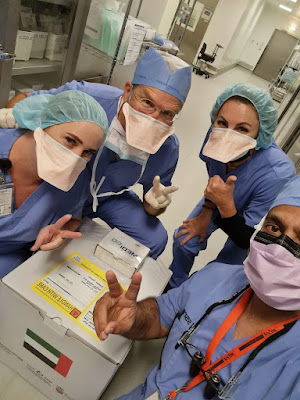If you're just tuning in, you can follow the story of the kidney exchange between the UAE and Israel here. The pairs who exchanged kidneys were an Israeli Arab husband and wife, a Jewish Israeli mother and daughter, and a mother and daughter who wish to be identified only as Arab residents of the United Arab Emirates. (I joined their family at their home for a meal when I was in Abu Dhabi, but won't say more about them.)
It isn't a surprise that the donor in each pair couldn't donate to the intended recipient, because in each pair the recipient was a highly sensitized mother ( i.e. for whom it was hard to find a compatible kidney, because she had many antibodies against human proteins). During childbirth, mothers can develop such antibodies to the father's proteins that the children inherited. So the father and the daughters were incompatible donors, since the mother had antibodies against the paternal proteins (human leukocyte antigens) in their kidneys. Together with the fact that the mothers were quite hard to match, and that Israel and the UAE are both small, each with populations of around ten million, they had to look across national borders.
Cross border kidney exchange requires some diplomacy, particularly when the countries involved are getting together for the first time (and don't necessarily have a long history of cooperation). The key medical diplomats were Dr. Tamar Ashkenazi* the director of Israel Transplant and Dr Ali Abdulkareem Al Obaidli, Chairman of the UAE National Transplant Committee. (Other key collaborators in the complicated logistics were Itai Ashlagi at Stanford and Atul Agnihotri and Mike Rees of the Alliance for Paired Kidney Donation.)
So this was the plan:
And here's a picture of the Abu Dhabi kidney packed for shipping (masked in the picture are Sue and Mike Rees, who have a lot of experience with packing and shipping kidneys, another nurse whose name I don't know, and Dr. Muhammad Badar Zaman the UAE transplant surgeon who transplanted the kidney that was on the way.
The little box taped to the top of the shipping container allows the kidney to be tracked in transit, via an app that gives you a picture of where it is at it travels:
And here's the swap of the two kidneys in shipping containers in the airport in Abu Dhabi (Tamar Ashkenazi and Dr. Ali are in the center, Atul and Mike are at the two ends...). Dr Ashkenazi was on both legs of the flight above--she flew in with the Israeli kidney and flew out with the UAE kidney.
On my last night in Abu Dhabi I had dinner with a lot of the docs. Across from me in the picture below are the two surgeons most actively involved in this exchange on the UAE side, transplant surgeon Dr. Zaman and the nephrectomy surgeon Dr. Hamid Reza Toussi. Next to me is the nephrologist Dr. Mohamed Yahya Seiari.











No comments:
Post a Comment